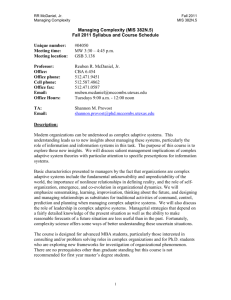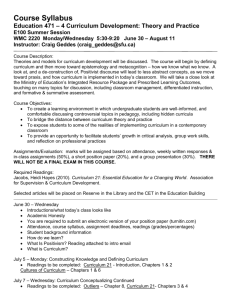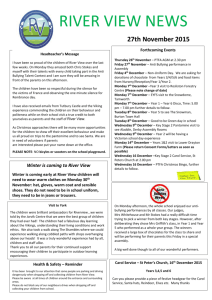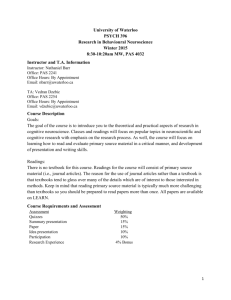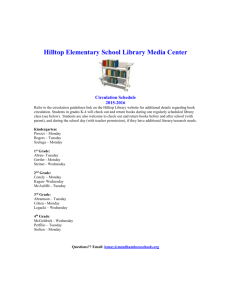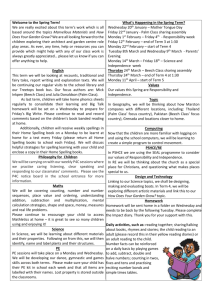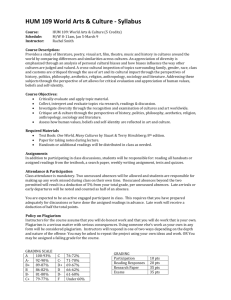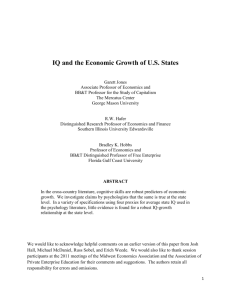Course Syllabus - Faculty - The University of Texas at Austin
advertisement
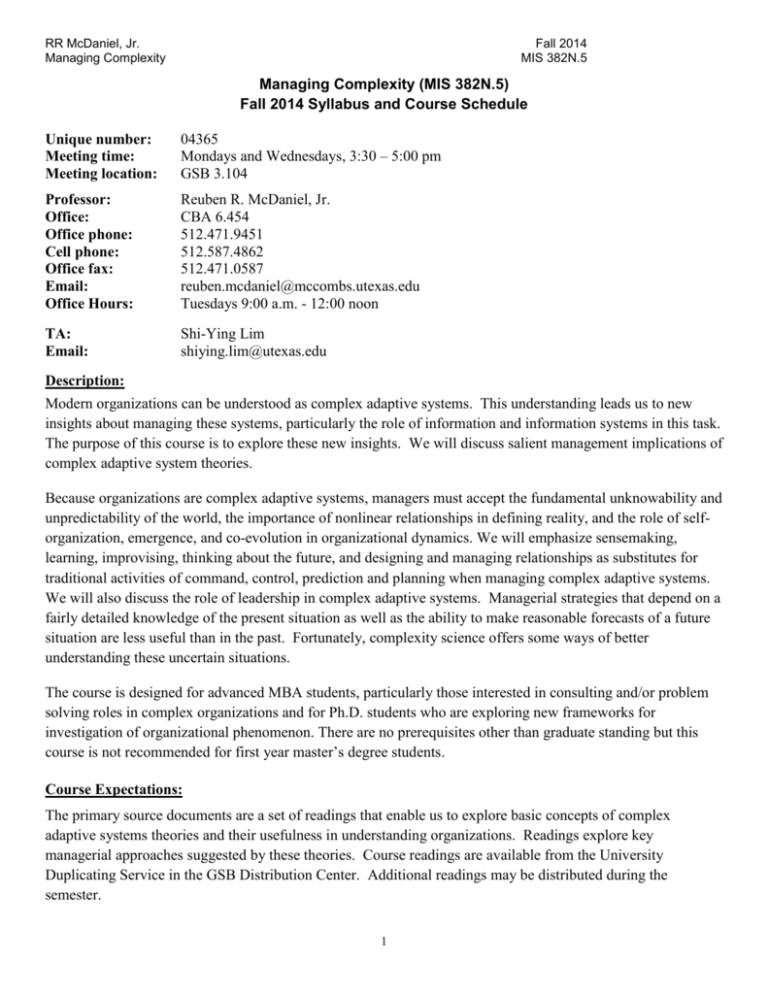
RR McDaniel, Jr. Managing Complexity Fall 2014 MIS 382N.5 Managing Complexity (MIS 382N.5) Fall 2014 Syllabus and Course Schedule Unique number: Meeting time: Meeting location: 04365 Mondays and Wednesdays, 3:30 – 5:00 pm GSB 3.104 Professor: Office: Office phone: Cell phone: Office fax: Email: Office Hours: Reuben R. McDaniel, Jr. CBA 6.454 512.471.9451 512.587.4862 512.471.0587 reuben.mcdaniel@mccombs.utexas.edu Tuesdays 9:00 a.m. - 12:00 noon TA: Email: Shi-Ying Lim shiying.lim@utexas.edu Description: Modern organizations can be understood as complex adaptive systems. This understanding leads us to new insights about managing these systems, particularly the role of information and information systems in this task. The purpose of this course is to explore these new insights. We will discuss salient management implications of complex adaptive system theories. Because organizations are complex adaptive systems, managers must accept the fundamental unknowability and unpredictability of the world, the importance of nonlinear relationships in defining reality, and the role of selforganization, emergence, and co-evolution in organizational dynamics. We will emphasize sensemaking, learning, improvising, thinking about the future, and designing and managing relationships as substitutes for traditional activities of command, control, prediction and planning when managing complex adaptive systems. We will also discuss the role of leadership in complex adaptive systems. Managerial strategies that depend on a fairly detailed knowledge of the present situation as well as the ability to make reasonable forecasts of a future situation are less useful than in the past. Fortunately, complexity science offers some ways of better understanding these uncertain situations. The course is designed for advanced MBA students, particularly those interested in consulting and/or problem solving roles in complex organizations and for Ph.D. students who are exploring new frameworks for investigation of organizational phenomenon. There are no prerequisites other than graduate standing but this course is not recommended for first year master’s degree students. Course Expectations: The primary source documents are a set of readings that enable us to explore basic concepts of complex adaptive systems theories and their usefulness in understanding organizations. Readings explore key managerial approaches suggested by these theories. Course readings are available from the University Duplicating Service in the GSB Distribution Center. Additional readings may be distributed during the semester. 1 RR McDaniel, Jr. Managing Complexity Fall 2014 MIS 382N.5 Each student is required to complete a major paper. The paper may be on any topic of the student’s choosing; however, it must demonstrate to the instructor that the student understands the material of the course. Class discussion and readings up to and including the material covered on Wednesday, November 24 should be covered in the final paper. In order to receive an A on this assignment, it should include some ideas about complex adaptive systems and their management that extend beyond the material covered in the course. The length of the paper is dependent upon the topic chosen and the student’s writing skill. In the past, papers have ranged from 20 - 50 pages in length. A hard copy of the paper is due at the beginning of class on Wednesday, December 3. The major paper will count for 40% of the final grade. Each student is required to prepare two Discussion Papers (written discussions of two articles): one from the first section of the course (Paper A) and one from the second (Paper B). Students’ discussion papers should not summarize the article. Rather, they should show how the article relates to other articles assigned for this course and to other scholarly material with which the student may be familiar or may find through research. Knowledge from your previous life experiences may be useful to enhance the discussion. The purpose of the discussion is to put the chosen article in a rich framework and to facilitate the understanding of the article for the class. These discussion papers should be no more than 7 pages in length (doubled spaced) and should be emailed via Canvas to the class, the TA, and the instructor. Papers must be emailed via Canvas 24 hours before the class period for which the chosen article is assigned. For example, if you are writing a discussion paper about an article assigned for class on Monday September 8, you should email your discussion paper to the whole class and the instructor via Canvas by 3:30 pm on Sunday September 7. If you are writing a discussion paper about an article assigned for class on Wednesday September 10, you should email your discussion paper via Blackboard by 3:30 pm on Tuesday September 9. The papers will be graded by the instructor on a scale of 14 – 20. Two points will be deducted from papers that are late. Discussion papers together will count for 40% of the final grade. The 40% grade allotment to these papers is an increase relative to previous years. The instructor would like to highlight the discussion papers as an opportunity to learn from each other and build writing skills that will help you for the final paper (and for the rest of your life). Students will be assigned the two readings upon which to base their Discussion Papers from the readings listed in the syllabus - one from the set of readings marked “A” and one from the set of readings marked “B”. In order to facilitate the assignment of readings, each student is asked to submit to the course TA a choice of two “A” papers and two “B” papers that they would like to review. Email these choices to the TA before midnight on Tuesday, September 2. Every effort will be made to accommodate your choices. We plan to email assignments by the end of the day on Wednesday, September 3. Class discussions will be based on the assigned readings and on the issues that students raise in written discussions of the readings. Attendance is required and you are expected to read all required readings before the class in which they are to be discussed. If you must miss a class, please be sure to notify the TA and instructor by email before the class that you miss. Remember, when you miss a class, assigned work must be turned in before the class missed and your participation expectations for that day must be made up in subsequent classes. Class participation will count for 20% of the final grade. 2 RR McDaniel, Jr. Managing Complexity Fall 2014 MIS 382N.5 McCombs Classroom Professionalism Policy The highest professional standards are expected of all members of the McCombs community. The collective class reputation and the value of the Texas MBA experience hinges on this. Faculty are expected to be professional and prepared to deliver value for each and every class session. Students are expected to be professional in all respects. The Texas MBA classroom experience is enhanced when: Students arrive on time. On time arrival ensures that classes are able to start and finish at the scheduled time. On time arrival shows respect for both fellow students and faculty and it enhances learning by reducing avoidable distractions. Students display their name cards. This permits fellow students and faculty to learn names, enhancing opportunities for community building and evaluation of in-class contributions. Students minimize unscheduled personal breaks. The learning environment improves when disruptions are limited. Students are fully prepared for each class. Much of the learning in the Texas MBA program takes place during classroom discussions. When students are not prepared they cannot contribute to the overall learning process. This affects not only the individual, but their peers who count on them, as well. Students respect the views and opinions of their colleagues. Disagreement and debate are encouraged. Intolerance for the views of others is unacceptable. Laptops are closed and put away. When students are surfing the web, responding to e-mail, instant messaging each other, and otherwise not devoting their full attention to the topic at hand they are doing themselves and their peers a major disservice. Phones and wireless devices are turned off. We’ve all heard the annoying ringing in the middle of a meeting. Not only is it not professional, it cuts off the flow of discussion when the search for the offender begins. When a true need to communicate with someone outside of class exists (e.g., for some medical need) please inform the professor prior to class. Academic Dishonesty I have no tolerance for acts of academic dishonesty. Such acts damage the reputation of the school and the degree and demean the honest efforts of the majority of students. The minimum penalty for an act of academic dishonesty will be a zero for that assignment. The responsibilities for both students and faculty with regard to the Honor System are described on http://mba.mccombs.utexas.edu/students/academics/honor/index.asp. As the instructor for this course, I agree to observe all the faculty responsibilities described therein. During Orientation, you signed the Honor Code Pledge. In doing so, you agreed to observe all of the student responsibilities of the Honor Code. If the application of the Honor System to this class and its assignments is unclear in any way, it is your responsibility to ask me for clarification. Students with Disabilities Upon request, the University of Texas at Austin provides appropriate academic accommodations for qualified students with disabilities. The office of Services for Students with Disabilities (SSD) is housed in the Office of the Dean of Students, located on the fourth floor of the Student Services Building. Information on how to register, downloadable forms, including guidelines for documentation, accommodation request letters, and releases of information are available online at http://deanofstudents.utexas.edu/ssd/index.php. Please do not hesitate to contact SSD at (512) 471-6259, VP: (512) 2322937 or via e-mail if you have any questions. Class Schedule and Reading Assignments You are required to read 2-4 articles for each class period. The readings should be done before the class assigned. For several of the articles, your classmates will have prepared a discussion paper which you should read before coming to class. Your goal should be to come to class prepared to discuss the topic with the required readings as a starting place for discussion. You are encouraged to use any material that you have access to in preparing for class discussion. There are numerous sources on the Internet for information about complexity theory. The reading packet is intended as a start, not as the end of insights into the topic. Use your imagination and your skills to enhance your sources of knowledge. Share your discoveries with the class so that we can all enjoy the fruits of your labor. 3 RR McDaniel, Jr. Managing Complexity Fall 2014 MIS 382N.5 Wednesday, August 27 – Session 1 Introduction Mintzberg, Henry (1996). Ten ideas designed to rile everyone who cares about management. Harvard Business Review, 6, 61-97. Binder, Philippe M. (2008). Theories of almost everything. Nature, 455(16), 884-885. Sullivan, Tim (2013). Embracing Complexity: An interview with Michael J. Mauboussion. Harvard Business Review, September 2013. Monday, September 1 Labor Day - No Class Wednesday, September 3 – Session 2 Overview of Complex Adaptive Systems Arthur, W. Brian (1999). Complexity and the economy. Science, April '99, Vol. 284, 107-109. McDaniel, Reuben R., Jr. (2007). Management Strategies for Complex Adaptive Systems: Sensemaking, Learning, and Improvisation. In Performance Improvement Quarterly, Vol. 20, 21 – 42. Homer-Dixon, Thomas (2010). Complexity Science and Public Policy. Based on the Canada School of Public Service’s 2010 John L. Manion Lecture, delivered May 5, 2010 at National Arts Centre in Ottowa and entitled Complexity, Crisis and Change: Implications for the Federal Public Service. www.homerdixon.com. Monday, September 8 – Session 3 Overview of Complex Adaptive Systems Sargut, Gokce and McGrath, Rita Gunther (2013). Learning to Live with Complexity. Harvard Business Review, September 2013, 68 – 76. Hutchins, Edwin (1995). How a Cockpit Remembers Its Speeds. Cognitive Science, 19, 265 – 288. McDaniel, Reuben R., Jr. (2004). Chaos and Complexity in a Bioterrorism Future. In John D. Blair, Myron D. Fottler, & Albert C. Zapantam (Eds.). Advances in Health Care Management, Vol. 4, 119139. Oxford, UK: Elsevier, Ltd. 4 RR McDaniel, Jr. Managing Complexity Fall 2014 MIS 382N.5 Wednesday, September 10 – Session 4 The Science of Complexity Presentation by Dr. Linda Reichl, Professor of Physics and Director of The Center for Complex Quantum Systems, The University of Texas at Austin. A. Reichl, Linda E. (2005). Fundamental “uncertainty” in science. In Reuben R. McDaniel, Jr. & Dean J. Driebe (Eds.). Uncertainty and Surprise in Complex Systems, 71-76. Springer-Verlag, Berlin. Prigogine, Ilya (1997). The rediscovery of value and the opening of economics. In Architecture and Design in America, 1-7. The University of Texas Press, Austin. Gershenson, Carlos (2013). The Implications of Interactions for Science and Philosophy: eprint arXiv:1105.2827. Monday, September 15 – Session 5 Complex Adaptive Systems: Overview of Structures A. Allen, Peter M., Strathern, Mark, & Baldwin, James S. (2005). The evolutionary complexity of social economic systems: The inevitability of uncertainty and surprise. In Reuben R. McDaniel, Jr. & Dean J. Driebe (Eds.). Uncertainty and Surprise in Complex Systems, 31-50. Springer-Verlag, Berlin. Weick, Karl E. (1987). Organizational Culture as a Source of High Reliability. California Management Review, 2, 112 – 127. Wednesday, September 17 – Session 6 Complex Adaptive Systems: Fundamental Uncertainty A. McDaniel, Reuben R., Jr., Jordan, Michelle E., & Fleeman, Bridgette F. (2003). Surprise, surprise, surprise! A complexity science view of the unexpected. Health Care Management Review, 28(3), 266278. Gladwell, Malcolm (2002). Blowing Up: How Nassim Taleb turned the inevitably of disaster into an investment strategy. The New Yorker, April 22 & 29, 162 – 173. Han, Paul K.J., Klein, William M.P., and Arora, Neeraj K. (2013). Varieties of Uncertainty in Health Care: A Conceptual Taxonomy. Medical Decision Making, published online 18 January 2013. 5 RR McDaniel, Jr. Managing Complexity Fall 2014 MIS 382N.5 Monday, September 22 – Session 7 Complex Adaptive Systems: Diversity of Agents A. Klein, Katherine J. and Harrison, David A. (2007). On the Diversity of Diversity: Tidy Logic, Messier Realities. Academy of Management Perspectives, 21(4), 26 – 33. McDaniel, Reuben R., & Walls, Michelle E. (1997). Diversity as a management strategy for organizations: A view through the lenses of chaos and quantum theories. Journal of Management Inquiry, 6(4), 371-383. Ashmos, Donde P., Huonker, John W., & McDaniel, Jr., Reuben R. (1998). Participation as a complicating mechanism: The effect of clinical professional and middle manager participation on hospital performance. Health Care Management Review, 23(4), 7-20. Wednesday, September 24 – Session 8 Complex Adaptive Systems: Communities of Practice A. Brown, John S. & Duguid, P. (1991). Organizational learning and communities-of-practice: Toward a unified view of working, learning, and innovation. Organization Science, 2: 40-57. Wenger, Ettienne. (2005). Communities of Practice: A Brief Introduction. http://www.ewenger.com/theory/index.htm Brown, John S. & Duguid, P. (2001). Knowledge and Organization: A Social-Practice Perspective. Organization Science, 12(2), 198 – 213. Monday, September 29 – Session 9 Complex Adaptive Systems: Emergence A. Goldstein, Jeffrey. (1999). Emergence as a Construct: History and Issues. Emergence, 1(1), 49 – 72. Lichtenstein, Benyamin M. Bergmann (2000). Emergence as a process of self-organizing. Journal of Organizational Change Management, 13(6), 526-544. 6 RR McDaniel, Jr. Managing Complexity Fall 2014 MIS 382N.5 Wednesday, October 1 – Session 10 Complex Adaptive Systems: Co-Evolution and Fitness Landscapes A. Levinthal, Daniel A., & Warglien, Massimo (1999). Landscape design: Designing for local action in complex worlds. Organization Science, 10(3), 342-357. Rivkin, J. W., & Siggelkow, N. (2002). Organizational sticking points on NK landscapes. Complexity, 7 (5), 31-43. Beinhocker, Eric D. (1999). Robust adaptive strategies. Sloan Management Review, 3, 95-106. Monday, October 6 – Session 11 Complex Adaptive Systems: Interactions of Ideas A. Cilliers, P. (2001). Boundaries, hierarchies and networks in complex systems. International Journal of Innovation Management, 5(2), 135-147. Allen, Peter M. & Varga, Liz (2007). Complexity: The co-evolution of epistemology, axiology and ontology. Nonlinear Dynamics, Psychology, and Life Sciences, 11(1), 19-50. Wednesday, October 8 – Session 12 Sensemaking Firestorm Video B. Weick, Karl E. (1993). The collapse of sense making in organizations: The Mann Gulch Disaster. Administrative Science Quarterly, 12(38), 628-652. Berwick, Donald M. (1999). Escape Fire: Lessons for the Future of Health Care. San Francisco, CA: Jossey-Bass. 7 RR McDaniel, Jr. Managing Complexity Fall 2014 MIS 382N.5 Monday, October 13 – Session 13 Sensemaking B. Weick, Karl E., & Roberts, Karlene H. (1993). Collective mind in organizations: Heedful interrelating on flight decks. Administrative Science Quarterly, 9(38), 357-381. Thomas, James B. & McDaniel, Reuben R., Jr. (1990). Interpreting strategic issues: Effects of strategy and the information-processing structure of top management teams. The Academy of Management Journal, 33(2), 286-306. Wednesday, October 15 – Session 14 Complex Adaptive Systems: Theory in Action “Appreciation of a System” - Presentation by Lloyd Provost, MS, Associates in Process Improvement Sterman, John D (2006). Learning from Evidence in a Complex World. American Journal of Public Health, 96(3), 505 – 514. Interview with Russell L. Ackoff (2003). Strategy & Leadership, 31(3), pp. 19 – 26. Macguire, Steve, McKelvey, Bill, Mirabeau, Laurent, & Öztas, Nail (2006). Complexity science and organization studies. In Stewart R. Clegg, et al., (Eds.). The SAGE Handbook of Organization Studies, 2nd edition, (pp. 165- 214). Sage Publication Ltd.: Thousand Oaks, California. Monday, October 20 – Session 15 Learning B. March, James G., Sproull, Less S., & Tasmuz, Michal (1991). Learning from samples of one or fewer. Organization Science, 2(1), 1-13. Simon, Herbert A. (1991). Bounded Rationality and Organizational Learning. Organization Science, 2(1): 125 – 134. Wednesday, October 22 – Session 16 Learning B. Tucker, Anita L., & Edmondson, Amy C. (2003). Why hospitals don't learn from failures: Organizational and psychological dynamics that inhibit system change. California Management Review, 45(2), 55-72. Weick, Karl E. & Sutcliffe, Kathleen M. (2003). Hospitals as cultures of entrapment: A re-analysis of the Bristol Royal Infirmary. California Management Review, 45(2), 73-85. 8 RR McDaniel, Jr. Managing Complexity Fall 2014 MIS 382N.5 Monday, October 27 – Session 17 Learning B. Edmondson, Amy C. (2003). Speaking up in the operating room: How team leaders promote learning in interdisciplinary action teams. Journal of Management Studies, 40(6), 1419-1452. Tucker, Anita L., Nembhard, Ingrid M., & Edmondson, Amy C. (2007). Implementing new practices: An empirical study of organizational learning in hospital intensive care units. Management Science, 53(6), 894-907. Wednesday, October 29 – Session 18 Improvisation Wynton Marsalis Video B. Barrett, Frank J. (1998). Creativity and improvisation in jazz and organizations: implications for organizational learning. Organizational Science, 9(5), 605-622. Weick, Karl E. (1998). Improvisation as a mindset for organizational analysis. Organizational Science, 9(5), 543-555. Monday, November 3 – Session 19 Improvisation B. Orlikowski, Wanda J. (1996). Improvising organizational transformation over time: A situated change perspective. Information Systems Research, 7(1), 63-92. McKenna, Kalin, Leykum, Luci K., McDaniel, Reuben, R. Jr., (2013). The role of improvising in patient care, Health Care Management Review, March 29 (published ahead of print). Wednesday, November 5 – Session 20 Relationships B. Lanham, H.J., McDaniel, R.R. Jr., Crabtree, B.F., Miller, W.L., Stange, K.C., Tallia, A.F., & Nutting, P.A. (2009). How improving practice relationships among clinicians and nonclinicians can improve quality in primary care. The Joint Commission Journal on Quality and Patient Safety, 35(9), 457-466. Kelleher, Herb (1997). A culture of commitment. Leader to Leader, 2, 20-24. 9 RR McDaniel, Jr. Managing Complexity Fall 2014 MIS 382N.5 Monday, November 10 – Session 21 Conversation B. Jordan, Michelle E., Lanham, Holly J., Crabtree, Benjamin F. et al. (2009). The role of conversation in health care interventions: Enabling sensemaking and learning. Implementation Science, 4(15). http://www.implementationscience.com/content/4/1/15. Gratton, Lynda (2006). Connections and conversations provide the fuel for innovation. Financial Times, March 30, 2006. Wednesday, November 12 – Session 22 Thinking about the Future Lecture on Formal Planning and Formal Control B. Eisenhardt, Kathleen M. (1990). Speed and strategic choice: How managers accelerate decision making. California Management Review, 2, 39-54. Stone, Melissa Middleton, & Brush, Candida Greer (1996). Planning in ambiguous contexts: The dilemma of meeting needs for commitment and demands for legitimacy. Strategic Management Journal, 17, 633-652. Cilliers, Paul (2006). On the importance of a certain slowness. E:CO, 8(3), 105-112. Monday, November 17 – Session 23 Information Systems B. Tanriverdi, Huseyin, Rai, Arun, and Venkatraman, N. (2010). Reframing the Dominant Quests of Information Systems Strategy Research for Complex Adaptive Business Systems. Information Systems Research, 21(4), 822-834. Weick, Karl E. (1985). Cosmos vs. chaos: Sense and nonsense in electronic contexts. Organizational Dynamics, 14(2), 51-64. 10 RR McDaniel, Jr. Managing Complexity Fall 2014 MIS 382N.5 Wednesday, November 19 – Session 24 Social Networks and Social Capital B. Watts, Duncan J. (2003). Innovation, adaptation, & recovery. In Six Degrees. W.W. Norton & Company, New York, New York, 253-289. Leana, Carrie R. (2013). The Missing Link in School Reform. Stanford Social Innovation Review, Fall 2013. Easley, David and Kleinberg, Jon. Networks, Crowds, and Markets: Reasoning about a Highly Connected World. Chapter 1: Overview. Complete preprint on-line at http://www.cs.cornell.edu/home/kleinber/networks-book/ Monday, November 24 – Session 25 Organizational Design B. Brown, Shona L., & Eisenhardt, Kathleen M. (1997). The art of continuous change: Linking complexity theory and time-paced evolution in relentlessly shifting organizations. Administrative Science Quarterly, 42, 1-34. Johnson, H. Thomas (2010). Toyota’s Current Crisis: The Price of Focusing on Growth Not Quality. The Systems Thinker, 21(1), 2 – 6. Wednesday, November 26 No Class – Happy Thanksgiving Monday, December 1 – Session 26 Leadership Weick, Karl E. (2001). Leadership as the legitimation of doubt. In W. Bennis, (Ed.). The Future of Leadership. San Francisco: Jossey-Bass. Lichtenstein, Benjamin B. et al. (2006). Complexity leadership theory: An interactive perspective on leading in complex adaptive systems. E:CO, 8(4), 2-12. Wednesday, December 3 – Session 27 Review and ***Final Paper Due*** 11
